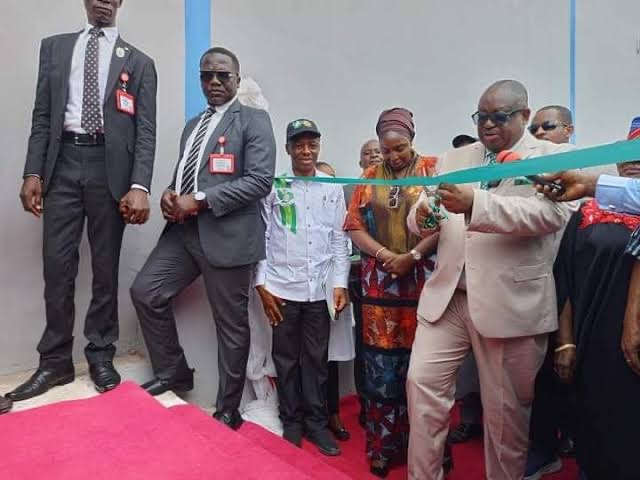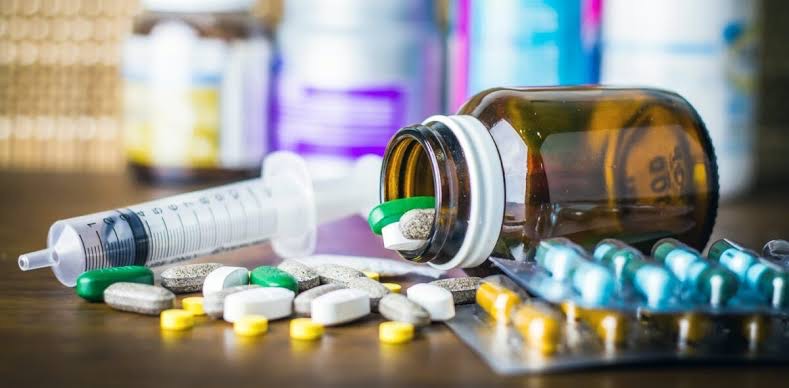The Plateau State Drugs and Medical Commodities Management Agency (PS-DMCMA) has officially launched the local production of pharmaceutical products in a significant move aimed at addressing the persistent issues of drug accessibility and affordability within the state.
This initiative marks a major step towards self-reliance in healthcare, as the state seeks to bolster its capacity to meet the growing demand for essential medications while reducing reliance on imports.
Kim Bot, the Executive Secretary of PS-DMCMA, made this announcement during an interview with Journalists on Thursday in Jos. As a pharmacist, Bot expressed his enthusiasm about the agency’s achievements so far and emphasized the importance of this local manufacturing effort.

He pointed out that the agency has already successfully produced five pharmaceutical products, signaling the beginning of a transformative phase in the state’s healthcare delivery system.
Manufactured Products;
The newly manufactured pharmaceuticals by PS-DMCMA include a variety of essential items designed to meet the needs of local communities.
These products encompass:
- Cough syrup
- Antacid (Mist. Magnesium Trisilicate) for oral use
- Methylated spirit, an antiseptic for external use
- Sanitizers for surface cleaning
Bot highlighted that these products have already undergone rigorous efficacy testing, with results proving highly successful. He proudly stated, “The efficacy of the products had been tested and superb results were gotten.”
This development is not only a testament to the agency’s commitment to quality but also serves as a crucial step toward ensuring the availability of safe and effective medications within the state.
Pharmaceutical-Grade Warehouse;
In addition to the successful manufacturing of these products, Bot also discussed the agency’s state-of-the-art pharmaceutical-grade warehouse. This facility reflects the Plateau State government’s dedication to maintaining high standards in the pharmaceutical supply chain.
The warehouse is equipped with advanced temperature control systems, cutting-edge inventory management technology, and stringent security measures, all aimed at ensuring the safety and integrity of the pharmaceutical products.
Bot explained, “This warehouse serves as a vital link between pharmaceutical manufacturers and healthcare providers, ultimately benefiting countless patients who rely on these essential medicines.” The establishment of this facility further demonstrates the government’s commitment to improving the healthcare system, ensuring that high-quality medicines are readily available for the people of Plateau State.
NAFDAC Registration and Certification;
As the agency moves forward, Bot outlined plans to expand the production of pharmaceutical products, contingent upon securing registration and certification from the National Agency for Food and Drug Administration and Control (NAFDAC).

This regulatory approval is critical for the agency to scale up production and ensure that the locally manufactured products meet national standards for safety and efficacy.
The bot also highlighted that the majority of the raw materials used in the production of these pharmaceutical products were sourced locally, with only one ingredient being imported.
This emphasis on local sourcing aligns with the broader goals of promoting local industry and reducing dependence on foreign imports, which is a key aspect of the state’s strategy for improving drug accessibility and affordability.
As Bot reiterated, “The efforts would bring about accessibility and affordability,” emphasizing the positive impact this initiative is expected to have on public health.
Governor Caleb Mutfwang’s Commitment to Healthcare;
Bot took the opportunity to commend Governor Caleb Mutfwang for his steadfast commitment to improving healthcare in Plateau State.
He acknowledged the governor’s leadership and efforts to ensure that the residents of the state receive the best possible healthcare services, especially through initiatives such as the local production of pharmaceutical products.
This support from the state government is seen as a crucial factor in the success of the PS-DMCMA’s endeavors.
National Push for Local Pharmaceutical Production;
On a broader scale, Nigeria’s pharmaceutical sector is making significant progress in increasing local drug production. With a national goal of reaching 70% manufacturing capacity, the country is striving to enhance its self-sufficiency in the production of essential medicines.
Prof. Mojisola Adeyeye, the Director-General of NAFDAC, revealed that local drug production has already surpassed 30%, approaching 40%, with the aim of reducing importation to just 10% in the future. “Our goal is to increase local manufacturing to 70% while limiting importation to 10%,” Adeyeye emphasized.
In line with this initiative, NAFDAC has approved 105 applications for the establishment of drug manufacturing facilities across Nigeria, out of 143 submissions.
These facilities are required to comply with the Good Manufacturing Practice (GMP) standards set by the World Health Organization (WHO) as well as NAFDAC’s own GMP regulations for medicinal products, which were established in 2021.
According to Adeyeye, 35% of the approved facilities have already completed construction and are moving forward with the registration process in accordance with NAFDAC’s guidelines for the establishment of pharmaceutical plants.
These efforts are part of a broader strategy to improve the affordability and security of medicines in Nigeria while reducing the country’s dependence on imported pharmaceuticals.
As local production increases, it is expected that drug prices will become more affordable, and the overall security of the nation’s pharmaceutical supply will be enhanced, benefiting countless Nigerians in need of essential healthcare services.
In conclusion, the local production of pharmaceutical products by the Plateau State Drugs and Medical Commodities Management Agency is a significant development that promises to improve drug accessibility, affordability, and self-reliance in healthcare within the state.
With continued support from both the state government and the wider pharmaceutical industry, this initiative has the potential to inspire similar efforts across Nigeria and contribute to the nation’s ongoing pursuit of greater self-sufficiency in healthcare.

































